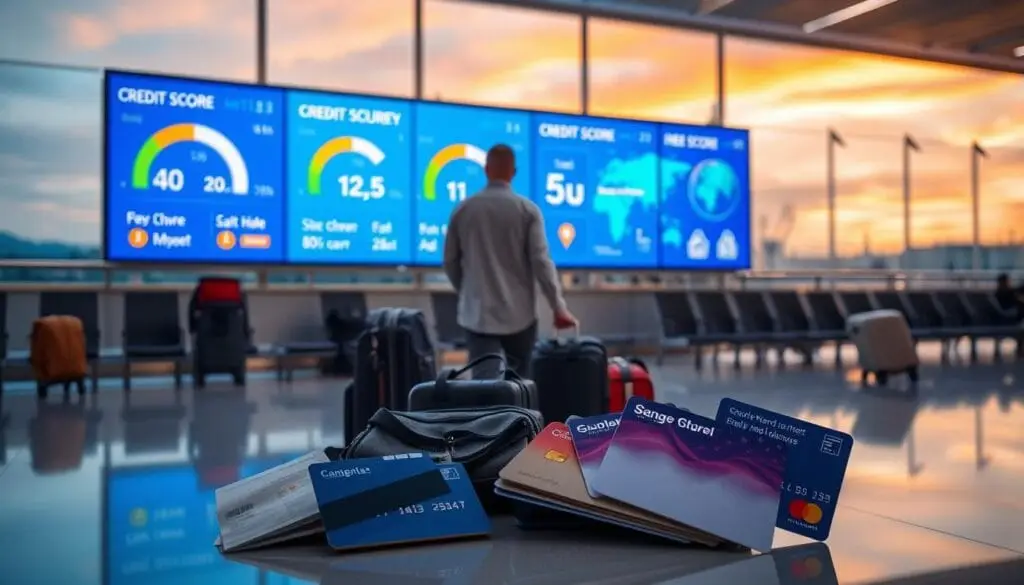A hard credit inquiry can lower your credit score by up to 10 points. This fact shows how important it is to understand credit report inquiries. A good credit score is key for getting the best travel rewards cards.
Credit inquiries make up 10% of your FICO score. This small percentage can greatly affect your chances of getting premium travel cards. It can also impact your ability to negotiate better rates.
Knowing about credit inquiries is crucial for travelers seeking maximum rewards. It helps you make smart choices about card applications and timing. This knowledge can support both short-term vacations and long-term travel goals.
Key Takeaways
- Hard inquiries can lower your credit score by up to 10 points
- Credit inquiries account for 10% of your FICO score
- Soft inquiries don’t affect your credit score
- Multiple inquiries within 45 days for the same credit type count as one
- Hard inquiries impact your score for up to 1 year but stay on reports for 2 years
- Regular credit monitoring is crucial for travelers managing multiple card applications
Understanding Credit Inquiries: Soft vs. Hard Pulls
Credit inquiries shape your credit score ranges and history length. They come in two types: hard and soft. Let’s explore their impact on your financial health.
What Defines a Soft Credit Inquiry
Soft inquiries happen when you check your credit or get pre-qualified offers. They don’t affect your credit score. These can occur without your direct approval.
Examples include:
- Checking your credit score
- Receiving promotional credit card offers
- Employment background checks
What Constitutes a Hard Credit Inquiry
Hard inquiries occur when you apply for new credit. They can impact your credit score. These inquiries stay on your report for up to two years.
Common scenarios include:
- Applying for a new credit card
- Requesting a mortgage
- Seeking an auto loan
Key Differences Between Inquiry Types
Soft and hard inquiries differ in their impact and visibility. The main distinctions are shown in the table below.
| Aspect | Soft Inquiry | Hard Inquiry |
|---|---|---|
| Credit Score Impact | No effect | Can lower score by 1-5 points |
| Visibility on Credit Report | Only visible to you | Visible to all creditors |
| Duration on Report | About 2 years | Up to 2 years |
Knowing these differences helps you manage your credit profile better. This is crucial when seeking travel rewards opportunities. A single hard inquiry may not greatly impact your score.
However, multiple inquiries in a short time could worry lenders. Be mindful of this when applying for credit.
The Impact of Credit Inquiries on Your Score: What Travelers Should Know
Credit card inquiries can affect your credit score. Let’s explore how these inquiries impact travelers seeking rewards. We’ll share some helpful tips for managing your credit score.
Hard inquiries occur when you apply for a new credit card. They can lower your score slightly. A single hard inquiry typically drops your FICO score by less than five points.
Most people recover from this small dip within 3 to 6 months. This assumes no further inquiries are made during that time.
Hard inquiries make up only 10% of your FICO score. They stay on your credit report for two years. However, FICO only considers inquiries from the past 12 months.
Timing matters when applying for multiple cards. Each credit card application triggers its own hard inquiry. Space out your applications to minimize the impact on your score.
Consider using credit monitoring services. These can help you track changes in your score over time.
| Inquiry Type | Impact on Credit Score | Duration on Credit Report |
|---|---|---|
| Hard Inquiry | ~5 point decrease | 2 years |
| Soft Inquiry | No impact | Not applicable |
Good credit habits can offset the impact of hard inquiries. Make timely payments and keep your credit utilization low. This helps maintain a healthy credit score.
Understanding these factors helps you make smart decisions. You can apply for travel rewards cards without hurting your credit score.
How Travel Credit Card Applications Affect Your Score
Travel credit card applications can impact your credit score. Let’s explore how these applications affect your financial health.
Initial Score Impact from Applications
A hard inquiry is placed on your credit report when you apply. This usually lowers your score by 3-5 points for about six months.
Multiple applications in a short time can have a bigger impact. It’s best to space out your applications.
Long-term Effects on Credit History
Credit inquiries stay on your report for two years. Their impact on your score lessens over time.
New accounts affect your credit history length. Apply for no more than 2-3 new cards per year.
Recovery Timeline After Hard Inquiries
Your score typically bounces back from hard inquiries within six months. Maintain a good credit utilization ratio (below 30%) to speed up recovery.
Make timely payments to help your score. Payment history accounts for one-third of your credit score.
| Credit Score Range | Classification | Card Options |
|---|---|---|
| 670 and up | Good to Excellent | Best travel rewards cards |
| 580 to 669 | Fair | Capital One QuicksilverOne Cash Rewards |
| Below 580 | Bad | Secured credit cards |
Consider your current credit score when applying for travel cards. Choose cards that match your profile. This can boost approval chances and minimize credit score impact.
Managing Multiple Travel Card Applications
Applying for travel credit cards requires a strategic approach. Careful planning helps maintain a strong credit score while maximizing travel rewards. This balance is key to successful credit card management.
Spacing out applications is crucial. Chase’s 5/24 rule limits approvals for multiple cards. Capital One allows only one new card every six months. Following these guidelines increases your approval chances.
Consider these tips for managing your credit score:
- Track your application dates
- Keep older accounts open to maintain credit history length
- Use each card regularly to prevent inactivity closures
- Pay balances in full to avoid interest charges
Each new application typically results in a hard inquiry. This can temporarily lower your score. However, responsible use of multiple cards can improve your credit over time.
It boosts your available credit and shows good payment history. These factors contribute positively to your overall credit health.
“I manage 16 credit cards while maintaining a score over 800. It’s all about strategic applications and diligent account management.”
Choose cards that align with your travel goals. Space out your applications wisely. This strategy helps build a powerful rewards portfolio. It also ensures your finances stay in check for future adventures.
Credit Score Components and Inquiry Weight
Knowing credit score factors is key for travelers to improve their financial health. Let’s explore the main parts of your credit score. We’ll also see how inquiries affect your score.
FICO Score Breakdown
FICO scores, often used by lenders, look at five main factors:
- Payment history (35%)
- Credit utilization ratio (30%)
- Length of credit history (15%)
- New credit applications (10%)
- Credit mix (10%)
Paying bills on time and keeping credit use low are vital for a good score. Try to keep your credit use below 30%. A range of 1-10% is even better.
VantageScore Considerations
VantageScore, another popular model, weighs factors a bit differently:
- Payment history (40%)
- Credit age and mix (21%)
- Credit utilization (20%)
- Balances (11%)
- Recent credit behavior and inquiries (5%)
- Available credit (3%)
Inquiry Impact Percentage
Credit inquiries make up a small part of your score. For FICO, they’re 10% under “new credit”. VantageScore gives them 5% under “recent credit behavior”.
Hard inquiries can lower your score by a few points. But their effect lessens over time.
Credit scores usually range from 300 to 850. A score above 670 is good. Scores over 740 are very good to exceptional.
Focus on the most important factors to boost your score. This can help you get better travel rewards cards.
| Credit Score Range | Category | Impact on Travel Rewards |
|---|---|---|
| 800-850 | Exceptional | Best travel card offers, highest approval odds |
| 740-799 | Very Good | Excellent travel card options, high approval chances |
| 670-739 | Good | Good travel card choices, decent approval odds |
| 580-669 | Fair | Limited travel card options, lower approval chances |
| 300-579 | Poor | Few to no travel card options, focus on credit building |
Strategic Timing for Travel Card Applications
Timing is key when applying for travel credit cards. Smart planning helps maximize benefits and manage your credit score. Let’s look at strategies for the best application timing.
Optimal Application Spacing
Space out your travel credit card applications. Wait 3-6 months between each one. This helps minimize the impact on your credit score.
Each application typically drops your score by 5-10 points. Spacing them out reduces this effect.
Card Issuer-Specific Rules
Different card issuers have unique application rules. Chase has the 5/24 rule. They limit approvals if you’ve opened 5 or more cards in 24 months.
American Express often restricts welcome bonuses. They usually allow only one bonus per lifetime for each card product.

Season-based Application Strategy
Align your applications with peak travel seasons. Many issuers offer higher bonuses during summer and holidays. Offers might jump from 50,000 to 75,000 points.
Timing your applications around these promotions can boost your rewards significantly.
| Season | Typical Bonus Points | Elevated Bonus Points |
|---|---|---|
| Standard Offer | 50,000 | N/A |
| Summer Promotion | 60,000 | 75,000 |
| Holiday Season | 65,000 | 80,000 |
Plan carefully when applying for travel cards. Understand these strategies to build a strong rewards portfolio. You can do this while keeping your credit score healthy.
Credit Monitoring While Traveling
Keeping tabs on your credit health is vital, especially during your travels. Credit monitoring services track changes to your credit report. They alert you to potential issues quickly and efficiently.
Travelers face a 20% higher risk of identity theft compared to those who stay home. This makes credit monitoring even more crucial for globetrotters.
Set up alerts and check your credit reports regularly when abroad. You can get free weekly copies from Equifax, Experian, and TransUnion.
If you’re not actively improving your score, check it two to four times yearly. This helps you stay informed about your credit status.
- Set up a fraud alert before your trip
- Avoid using public Wi-Fi for sensitive transactions
- Change online passwords before traveling
- Use identity monitoring services to track personal information
- Set up a mail hold when away for extended periods
These practices safeguard your credit while you explore new places. Your financial security is as crucial as your physical safety when traveling.
| Credit Monitoring Feature | Benefit for Travelers |
|---|---|
| Daily credit file checks | Rapid detection of suspicious activity |
| Identity theft insurance | Up to $1 million reimbursement for recovery expenses |
| Credit limit change alerts | Notifies of changes over $100 or 30% utilization shifts |
| Address change monitoring | Alerts if address changes are reported to USPS |
Protecting Your Credit Score During International Travel
International travel brings excitement and new experiences. It also requires careful credit score management. Smart travelers know how to safeguard their financial health while exploring the world.
Foreign Transaction Considerations
Choosing the right credit cards is crucial when traveling internationally. Some cards charge foreign transaction fees ranging from 0% to 5%. Opting for no-fee cards can save you money and help manage your credit score.
High foreign transaction fees can increase your credit utilization. This can potentially impact your score. Be mindful of these fees when using your cards abroad.

International Credit Checks
Credit checks abroad differ from domestic inquiries. Most international credit checks won’t affect your U.S. credit score. However, it’s wise to monitor your credit activity while traveling.
Using credit monitoring services can help you track changes to your credit report. This allows you to stay informed about your credit status during your trip.
Travel Alert Importance
Setting up travel alerts with your credit card issuers is a simple yet effective precaution. It takes only about 5 minutes but can significantly reduce the risk of card declines abroad.
Although 85% of credit card issuers use advanced fraud detection tools, notifying them of your travel plans helps. It can prevent unnecessary account freezes and ensure smooth transactions during your trip.
| Travel Behavior | Percentage |
|---|---|
| Travelers who don’t set alerts for U.S. travel | 70% |
| Travelers who don’t inform banks of travel plans | 50% |
| Reduction in card decline incidents with proper notification | 90% |
Following these credit score tips can help you enjoy your international adventures worry-free. A little preparation goes a long way in protecting your financial future. Stay proactive and make the most of your global experiences.
Best Practices for Travel Rewards Card Management
Managing travel rewards cards is key to maximizing benefits and maintaining a healthy credit profile. Keep track of application dates, annual fees, and bonus categories. This organization helps you make smart decisions about your cards.
Optimize credit utilization across cards to manage your credit score effectively. Try to keep your overall utilization below 30%. Regular credit monitoring is crucial, especially while traveling, to spot unauthorized charges quickly.
- Pay bills on time, even while abroad
- Keep credit utilization low
- Monitor your credit regularly
- Set up travel alerts with your card issuers
Watch out for foreign transaction fees when using cards internationally. These fees can add up fast, as shown below:
| Expense | Cost | 2% Foreign Transaction Fee |
|---|---|---|
| Week at Hyatt Regency Paris Etoile (family of 4) | $6,429.35 | $128.58 |
| Louis Vuitton Neverfull MM tote bag | $2,030.00 | $40.60 |
| Disneyland Paris tickets (family of 4) | $468.62 | $9.37 |
Use these practices to navigate travel rewards cards wisely. You’ll enjoy the perks while keeping your credit score strong.
Conclusion
Credit inquiries can impact your credit score. It’s important to understand soft and hard pulls. Smart timing of credit card applications can help minimize negative effects.
Managing your credit score is key for travel rewards. Space out applications and follow issuer rules. This helps build a solid rewards portfolio without hurting your credit.
Payment history makes up 35% of your FICO score. Credit utilization accounts for 30%. Keep your utilization below 30% to boost your score.
Set up credit monitoring alerts for your travels. Tell your card issuers about your travel plans. Watch out for foreign transaction fees.
By using these strategies, you’ll enjoy travel rewards. You’ll also keep your credit score healthy. Happy travels and smart spending!
FAQ
Q: How do credit inquiries affect my credit score?
A: Credit inquiries can slightly impact your credit score. Hard inquiries may lower your score temporarily by a few points. Soft inquiries, like checking your own credit, don’t affect your score.
Q: What’s the difference between a soft pull and a hard pull on my credit?
A: Soft pulls don’t affect your credit score. They occur when you check your credit or receive pre-approved offers. Hard pulls happen when you apply for new credit and can slightly lower your score.
Q: How long do hard inquiries stay on my credit report?
A: Hard inquiries stay on your credit report for two years. Their impact on your credit score usually lessens after about 12 months.
Q: How many points will my credit score drop after applying for a travel credit card?
A: A travel credit card application might lower your score by 5-10 points. This effect is usually temporary and recovers within a few months.
Q: How often should I apply for new travel credit cards?
A: It’s best to space out your travel credit card applications. Wait 3-6 months between applications to minimize impact on your credit score.
Q: Do credit card issuers have specific rules for applications?
A: Yes, many issuers have specific rules. Chase has the “5/24 rule,” limiting approval if you’ve opened 5+ cards in 24 months. Research issuer-specific rules before applying.
Q: How can I monitor my credit score while traveling?
A: Use credit monitoring services with mobile apps for easy access while traveling. Some credit card issuers offer free credit score monitoring to cardmembers.
Q: Will using my credit card abroad affect my credit score?
A: Using your credit card abroad doesn’t directly impact your credit score. Be mindful of your credit utilization ratio, as foreign fees can increase your balance.
Q: How important are credit inquiries compared to other factors in my credit score?
A: Credit inquiries account for about 10% of your FICO score. Payment history (35%) and credit utilization (30%) have a much larger impact.
Q: What should I do if I see an unauthorized hard inquiry on my credit report?
A: Contact the credit bureau immediately to dispute an unauthorized hard inquiry. Also, contact the company that made the inquiry to investigate potential identity theft.



